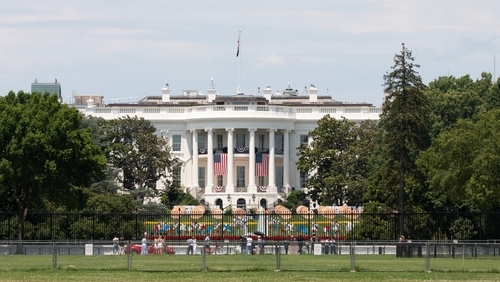Euro zone yields fall as global mood turns more fragile

By Stefano Rebaudo and Yadarisa Shabong
April 24 (Reuters) - Euro zone government bond yields dipped on Thursday after a rise in the previous session with investors cautious about real progress towards defusing a trade war between the U.S. and China.
Germany's 10-year bond yield DE10YT=RR, the benchmark for the euro zone bloc, dropped 4 basis points (bps) to 2.46%.
It had risen on Wednesday, after a report that the United States was considering cutting its tariffs on Chinese imports pushed investors into stocks.
Investors have turned to German bonds as safe havens in recent weeks. However, Bunds have underperformed their U.S. peers since yesterday after President Donald Trump backed down from threats to fire the head of the Federal Reserve and appeared to soften his stance on China.
U.S. Treasury yields declined -- with the 10-year US10YT=RR down 6 bps at 4.32% -- on Thursday on tentative hopes of lower-than-feared U.S. tariffs and the possibility of a first interest rate cut by the Federal Reserve in June.
"President Donald Trump's recent concessions about wanting to negotiate lower tariffs on China have come with a seeming begrudgingness - and mainly as a stop-gap measure to avoid bare shelves at the U.S.'s discount retailers - rather than a permanent good-faith overture," said Thierry Wizman, global forex and rates strategist at Macquarie.
Also in the mix on the euro area front was the Ifo survey showing German business morale unexpectedly rose in April, though uncertainty among companies has increased.
"The improvement in the Ifo in April may be another sign that tariff front-loading, which was also mentioned by PMI respondents, supported activity somewhat in April," Franziska Palmas, senior Europe economist at Capital Economics, said.
"Nevertheless, the big picture remains that the German economy is still very weak."
That followed data on Wednesday that pointed to stalling business activity growth in the euro zone area this month.
U.S. President Donald Trump's global tariffs have whipsawed markets, and potential signs of easing in trade tensions had come as a relief to investors.
A spokesman for China's commerce ministry separately said that the United States should lift all unilateral tariff measures against China if it "truly" wanted a resolution.
In response to the reports about talks between China and the U.S., a Chinese foreign ministry spokesperson said on Thursday they have not held consultations or negotiations on tariffs.
Meanwhile, businesses across multiple industries are warning of growing uncertainty as Trump's trade war pushes up costs, up-ends supply chains and stirs concerns about the global economy.
Italy's 10-year yield IT10YT=RR was lower by 8 bps at 3.55%, and the gap between Italian and German 10-year bonds DE10IT10=RR narrowed to 109 bps.
France's 10-year government bond yield FR10YT=RR fell 7.5 bps to 3.16%, with the yield gap versus German Bunds dropping to 71.50 bps. French consumer confidence steadied in April.
Germany's 2-year bond yield DE2YT=RR, which is more sensitive to European Central Bank rate expectations, dropped 6 bps to 1.68%.
Money markets expect the ECB's main rate at nearly 1.6% in December. EURESTECBM5X6=ICAP







